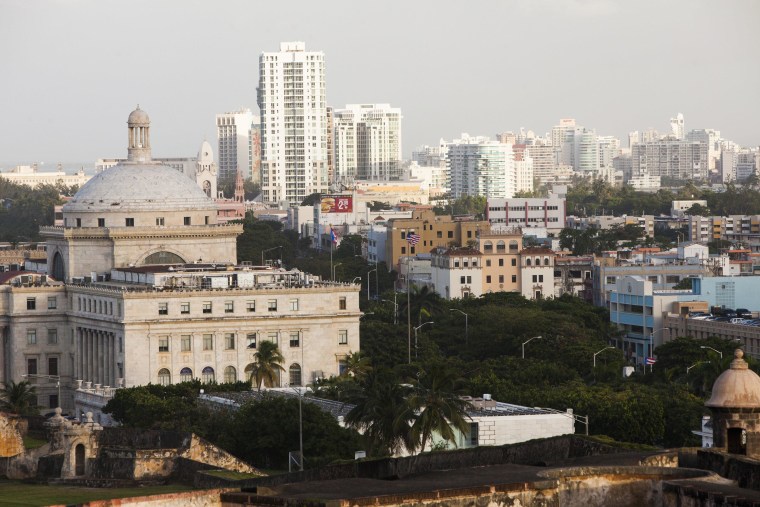As Congress and Puerto Rico’s government struggle to arrive at a sustainable path to the island’s fiscal and economic recovery, a group believes it has come up with a viable solution that provides a fiscal oversight framework that is not unilaterally imposed by Congress.
The Center for a New Economy, (CNE) a Puerto Rican non-partisan think tank, believes that fiscal responsibility laws (FRL’s) are the best option for a permanent improvement of Puerto Rico’s fiscal crisis that addresses the root causes that drove the island to the brink of bankruptcy and gives a voice to the citizens of the island.
FRL’s are mechanisms that would set up local monitorable fiscal targets and policy reforms, lend a much needed transparency and accountability to the process, and be the catalyst to the overhaul of Puerto Rico’s fiscal infrastructure.
RELATED: At Senate Hearing, Calls for Urgent Action on Puerto Rico
At an event hosted by CNE at the National Press Club in Washington, D.C., a panel discussed how these mechanisms would successfully bring fiscal balance to the island and place it on the road to financial health, beyond the sole reliance on a unilaterally imposed federally controlled board as advocated by some in the Congress and financial industry.
The ongoing debate takes place as the island is set to vote on Sunday in the Republican primaries, its 20 at- large delegates up for grabs. Florida stands as the glittering prize, where a large number of Puerto Ricans migrated to escape the island’s economic downturn.
Five million islanders live in the United States, and more than a million reside in Florida, a key swing state. They are largely credited with delivered the swing state, and the election, to President Barack Obama in 2008 and 2012. Puerto Ricans who live stateside can vote in the U.S. presidential elections; those who reside in the island do not.
Puerto Rico faces the worst economic and fiscal crisis of its history, brought about by a massive $70 billion debt and a looming budget gap of more than 20 billion. In addition, a more than 12 percent unemployment has fueled a population decline that exceeds the 1950’s Great Migration, stripping the island of its human capital.
CNE President Miguel Soto-Class began the debate by underlining that any solution to the current Puerto Rican crisis must have a legitimate base within the island and the participation of island officials in order to be a viable and long term proposition – and not one that hinges on a unilateral federal control board.
Soto-Class stated that until now, the debate has been a binary one - with one side standing by a strong federal control board, while the other argued that no oversight authority at all is best option for the island.
“What Puerto Rico needs is a solution that accepts and embraces the rebuilding of our fiscal institutions so that progress can be enduring. A Deus ex Machina control board will not necessarily tackle this, and so the roots of our problems will remain,” he said.
“What’s more, I feel this is a conversation where important voices have been left out of the room, namely, the opinions of those of us who are citizens of Puerto Rico, who have borne the brunt of the fiscal and economic crisis and who will have to live with the eventual remedies.”
Andrés Velasco, professor at Columbia University and former finance minister of Chile, pointed out that FRL’s have been successfully applied in the past, while Gordon Gray, fiscal policy director at American Action Forum, stressed that any law would have to take into account the island’s complicated political scenario.
Tracy Gordon, senior fellow at Urban-Brookings Tax Policy Center, spoke about how FRL’s had played out in the United States and the mechanisms utilized, while CNE Public Policy Director Sergio Marxuach proposed that a Fiscal Responsibility Law could be tailored to tackle Puerto Rico’s present day economic situation and take hold of fiscal policy in the long term.
Congressman Pedro Pierluisi, Resident Commissioner for Puerto Rico and Senator Eduardo Bahtia, President of the Puerto Rico Senate, both Puerto Rican elected officials, also participated in the discussions, warning that a unilateral federal control board, or “a board on steroids,” without a locally enacted and executed Fiscal Responsibility Law and a restructuring of the debt, would be detrimental to Puerto Rico.
“The problem of Puerto Rico is not the size of its government. The problem of Puerto Rico is the size of its debt,” said Bahtia, who favors the current commonwealth as part of the Popular Democratic Party.
Perluisi, a member of the New Progressive Party that advocates for statehood, stressed that Puerto Rico’s status is central to the island’s economic crisis.
“Puerto Rico’s unequal status is both the main cause of our economic and fiscal crisis and the main reason we cannot overcome the crisis without having to implore Congress for help,” he said.
In order to overcome this crossroads in the island’s history, “Puerto Rico must become a state, or a sovereign nation, which let me underscore, are the only two possible alternatives to the territory status,” he said.
“We must be first class citizens in this nation, or we must be first class citizens in our own nation.”
